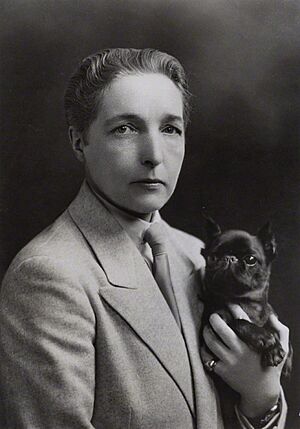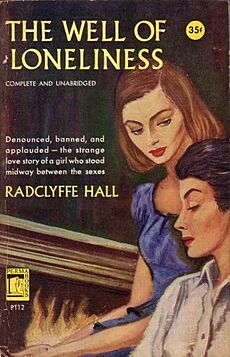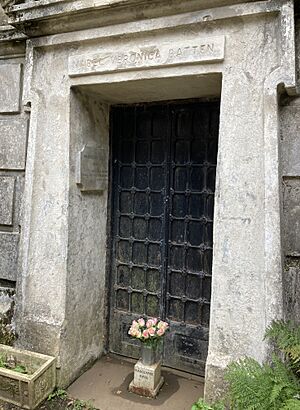Radclyffe Hall facts for kids
Quick facts for kids
Radclyffe Hall
|
|
|---|---|

Hall c. 1930
|
|
| Born | Marguerite Antonia Radclyffe Hall 12 August 1880 Bournemouth, Hampshire, England |
| Died | 7 October 1943 (aged 63) London, England |
| Pen name | John |
| Occupation |
|
| Period | 1906–1936 |
| Notable works | The Well of Loneliness (1928) |
| Partners | Mabel Batten Una Troubridge |
| Signature | |
Marguerite Antonia Radclyffe Hall (born August 12, 1880 – died October 7, 1943) was an English poet and author. She is well-known for her novel The Well of Loneliness. As an adult, Hall often preferred to be called John instead of Marguerite.
Contents
Early Life and Friendships

Marguerite Antonia Radclyffe Hall was born in 1880 in Bournemouth, England. Her father, Radclyffe Radclyffe-Hall, came from a wealthy family. Her mother was Mary Jane Sager. Hall's father left the family in 1882, but he left a large inheritance for Radclyffe.
Later, Hall's mother married Albert Visetti, a singing teacher. Radclyffe did not get along well with her mother or stepfather. Her mother often used Radclyffe's inheritance money for herself.
As Hall grew up, she realized her inheritance meant she didn't need to work or marry. She began to live as she pleased. She often dressed in men's clothing of the time, like trousers, monocles, and hats.
In 1907, Hall met Mabel Batten in Germany. Batten was a well-known singer, 51 years old, while Hall was 27. They became very close friends. After Batten's husband passed away, they decided to live together. Batten introduced Hall to many artistic and intellectual women. Batten was also the first to call Hall "John," a name Hall used for the rest of her life. Batten encouraged Hall to start publishing her poetry.
In 1915, Hall became close with Batten's cousin, Una Vincenzo, Lady Troubridge. Troubridge was a sculptor and had a young daughter. Troubridge and Hall became companions for the rest of their lives. This friendship caused some tension between Batten, Hall, and Troubridge. Batten passed away in 1916. In 1917, Radclyffe Hall and Una Troubridge began living together. Their friendship lasted until Hall's death.
Writing Career
After traveling and studying, Hall published five books of poetry between 1906 and 1915.
Her first novel, The Unlit Lamp, was published in 1924. It tells the story of Joan Ogden, a young girl who dreams of becoming a doctor. She feels held back by her mother's strong reliance on her. Because this book was long and serious, Hall chose a lighter topic for her next novel. This was a comedy called The Forge (1924). For her early poetry, she used her full name. For The Forge, she used M. Radclyffe Hall. This book was quite successful and appeared on a bestseller list. The Unlit Lamp was then printed with her name simply as Radclyffe Hall.
Next came another funny novel, A Saturday Life (1925). Then, she wrote Adam's Breed (1926). This novel is about an Italian waiter who becomes unhappy with his job and even with food. He gives away his things and lives alone in the forest. This book had deep, spiritual themes. It sold well and received good reviews. It won two important awards: the Prix Femina and the James Tait Black Prize. Only one other author, E. M. Forster, had won both awards before for his book A Passage to India. In 1926, she wrote her first short story that touched on themes of same-sex relationships. Soon after, she began writing The Well of Loneliness.
About The Well of Loneliness
Hall's most famous book is The Well of Loneliness. It was the only one of her eight novels to openly discuss themes of same-sex relationships. Published in 1928, the book follows the life of Stephen Gordon. The novel presents a sensitive and understanding picture of individuals who identify as "inverts," a term used at the time.
The book faced challenges in the United States before it could be published. Today, it is published by Virago Press in the UK and Anchor Press in the United States. In 1999, The Well of Loneliness was ranked number seven on a list of the top 100 novels about same-sex relationships by The Publishing Triangle. It is now seen as an important book that came before the "golden age" of similar stories.
The Girls of Radcliff Hall
A British composer named Gerald Tyrwhitt-Wilson, 14th Baron Berners, wrote a story called The Girls of Radcliff Hall. In this story, he described himself and his friends as schoolgirls at a school named Radcliff Hall. The book was written under the name Adela Quebec and was shared privately. The book caused a stir among Berners' friends and acquaintances in the 1930s. One of his friends even tried to have all copies destroyed. The book later became very rare. However, the story is included in Berners' Collected Tales and Fantasies.
Later Novels
Hall published one novel after The Well of Loneliness. During the controversy over The Well, a mocking poem called The Sink of Solitude appeared. It made fun of Hall and her book. One drawing in it showed Hall on a cross. This image upset her so much that she could barely talk about it for years. This feeling of guilt led her to choose a religious topic for her next novel, The Master of the House.
Hall insisted that The Master of the House be published without any description on the cover. This might have made some buyers think it was another book about "inversion." Early sales were strong, and the book reached number one on The Observer's bestseller list. However, it received poor reviews in some important magazines, and sales quickly dropped. In the United States, reviewers were kinder to the book. But soon after it was published, all copies were taken by creditors because Hall's American publisher went out of business. Another publisher took over the rights, but by the time the book could be re-released, its sales momentum was lost.
Later Years and Passing
Hall lived with Una Vincenzo, Lady Troubridge in London. In the 1930s, they lived in the small town of Rye, East Sussex, which was known for its many writers.
In 1930, Hall received the Gold Medal of the Eichelbergher Humane Award. She was a member of the PEN club, a group for writers. She was also on the council of the Society for Psychical Research and a fellow of the Zoological Society of London. Hall was listed at number 16 in the top 500 heroes in The Pink Paper.
Around 1934, while on holiday, Troubridge became ill. A Russian nurse, Evguenia Souline, was hired to care for her.
In 1943, Hall was diagnosed with cancer. Operations were not successful, and she passed away at 63 years old. Her body is buried in a vault at Highgate Cemetery in London, near where Mabel Batten is also buried.
Works
Novels
- The Forge (1924)
- The Unlit Lamp (1924)
- A Saturday Life (1925)
- Adam's Breed (1926)
- Miss Ogilvy Finds Herself (1926) - short stories
- The Well of Loneliness (1928)
- The Master of the House (1932)
- The Sixth Beatitude (William Heineman Ltd, London, 1936)
Poetry
- Dedicated to Sir Arthur Sullivan (England: s.n., 1894)
- Twixt Earth and Stars (London: John and Edward Bumpus Ltd., 1906)
- A Sheaf of Verses : Poems (London: J. and E. Bumpus, 1908)
- Poems of the Past & Present (London: Chapman And Hall, 1910)
- Songs of Three Counties and Other Poems (London: Chapman & Hall, 1913)
- The Forgotten Island (London: Chapman & Hall, 1915)
- Rhymes and Rhythms (Milan, 1948)
Archives
Many of Hall and Troubridge's papers are kept at the Harry Ransom Center at the University of Texas. These include a manuscript of The Well of Loneliness, notebooks, diaries, and letters. Copies of Hall's letters to Evguenia Souline from the late 1930s and early 1940s are at the Cadbury Research Library, University of Birmingham.
See also
 In Spanish: Radclyffe Hall para niños
In Spanish: Radclyffe Hall para niños
 | Shirley Ann Jackson |
 | Garett Morgan |
 | J. Ernest Wilkins Jr. |
 | Elijah McCoy |



